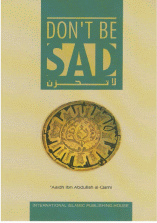Don't be Sad

A good life
A Western thinker said:
"lt is most possible for you, while you are behind steel bars, to look out upon the horizon and to smell roses. It is also extremely plausible for you to be in a castle replete with opulence and comfort, and yet be angry and discontented with your family and wealth."
Therefore happiness is not determined by time or by place, but instead by faith in Allah and obedience to Him, matters that are rooted in a person's heart. The heart has a far-reaching significance in that it is the place that Allah looks at and scrutinizes. If faith settles itself in the heart, happiness and tranquility will pervade both the heart and the soul.
Ahmad ibn Hanbal was a venerable scholar and a prolific compiler of hadith. He lived a productive life, yet he was not rich: his garment was patched in many places and every time it tore again, he would sew it himself He lived in a three-room structure made of mud. Often, all that he could find to eat was a piece of bread. And his biographers mention that he had the same shoes for seventeen years and he would often patch them up or sew them if there was a tear. `
Meat would find its way to his plate only once a month, and on most days he fasted. He journeyed throughout the lands seeking out ahaadeeth (hadiths). Yet, despite all of the hardships he had to bear, he was contented, comfortable, serene, and unworried, qualities that can be attributed to his fortitude, to his knowing his goal and final destination, to his seeking reward from Allah, and to his striving after the Hereafter and Paradise.
On the other hand, the rulers of his time, such as Al-Ma'moon, Al-Wathiq, Al-Mu'tasim and Al-Mutawakkil, all lived in castles. They owned hoards of gold and silver; an entire army was at their disposal; they had all that they desired. In spite of all their material wealth, they lived in turmoil and they spent their lives in anxiety and worry. Wars, uprisings, and insurgencies brought them misery. ln the records of history we even find that many of them would renounce the world bitterly on their deathbed, feeling regretful for their extravagances on the one hand and for their shortcomings on the other.
Shaykh ul-Islam Ibn Taymiyah is another example: he spent his time on this earth with no family, no place to call home, no wealth, and no position. He had a room adjoining the central mosque, a slice of bread to keep him going for the day, and two garments. Sometimes he would sleep in the mosque. But, as he said about his situation, his paradise was in his breast, his execution meant martyrdom, imprisonment was peaceful seclusion, and being exiled from his country meant traveling abroad as a tourist. Such sentiments could come from him only because the tree of faith in his heart had firm and solid roots.
(….whose oil would almost glow forth (of itself), though no fire touched it. Light upon Light! Allah guides to His Light whom He wills.)
(Qur'an 24: 35)
(He will expiate from them their sins, and will make good their state.)
(Qur'an 47: 2)
(While as for those who accept guidance, He increases their guidance, and bestows on them their piety.) (Qur'an 4 7: 17)
(You will recognize in their faces the brightness of delight.)
(Qur'an 83: 24)
Abu Dhar was a Companion known for his abstemious lifestyle. Taking with him his wife and children, he left the city and settled in an isolated location. After setting up his tent, most of his days were spent chiefly in worship, recitation of the Qur'an, and reflection. Most days he fasted. His worldly possessions were limited to a tent, some sheep, and a few other trifling things. Some friends visited him once and they asked, "Where is the world (i.e. where are the material things that others have)?" He said, "in my house is all that I need from this world, and the Prophet (bpuh) informed us that in front of us is an insurmountable obstacle (i.e. on the Day of Judgment), and no one will pass it (safely) except for the one who has a light load."
Despite living a life of penury, he had all that he needed from this world. As for superfluous possessions, he felt that they would divert him from his main purpose and would only cause him worry.
